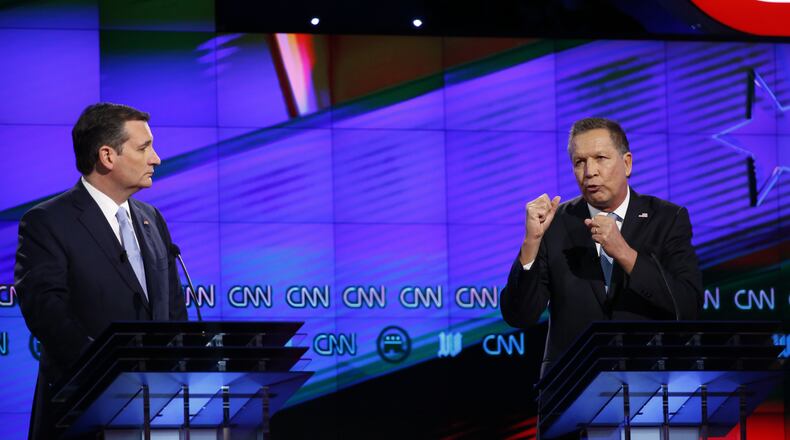Ted Cruz and John Kasich have finally done what the pundits have been imploring them to do for more than a month: Divvying up the remaining states to stop Donald Trump's march toward the GOP nomination.
In statements emailed within 10 minutes of each other late last night, the two campaigns said Cruz will focus on Indiana's May 3 primary while Kasich shifts his attention to Oregon (May 17) and New Mexico (June 7). Each campaign spoke of giving the other a "clear path" in those states. They'll compete with one another and Trump in the other 12 states yet to vote.
One obvious question is whether this is too little, too late. I don't think so. Since March 15 , when Trump forced Marco Rubio out of the race by beating him in Florida, eight states have awarded delegates. Cruz won the vast majority of delegates (167 out of 191 awarded so far) in Utah, Kansas, North Dakota, Colorado, Wisconsin and Wyoming. Trump won convincingly in Arizona and New York (147 out of 151). It's hard to see how Kasich or Cruz could have helped the other win more delegates in any of those states by staying out of them.
It's different in Indiana, at least (there hasn't been much public polling of New Mexico or Oregon). Trump leads Cruz by 6 points in the Real Clear Politics average of Indiana polls , but he's under 40 percent. Trump, who is expected to sweep the mid-Atlantic and Northeastern states voting Tuesday*, could virtually lock up the nomination in the Hoosier State: 57 delegates go to the winner (27 by congressional district, 30 to the statewide winner). But it's still quite possible for Cruz to pull ahead there, keeping the race going, if Kasich stands aside.
Another obvious question is whether this will look like "the establishment" is ganging up on Trump. I find this laughable for two reasons. First, the idea that Ted Cruz has the backing of the establishment, against whom he's fought since the Texas GOP primary for the U.S. Senate four years ago, is hilarious on its face. Second, this alliance is being announced just as the Republican National Committee has been listening to Trump's pitch ( strange as it may be ) for uniting the party behind him as nominee, even if he doesn't reach 1,237 delegates through the voting process. In fact, the Cruz-Kasich alliance seems more indicative that they don't enjoy the backing of the establishment and are having to go to drastic measures to stop Trump. At the very least, the establishment isn't strong enough to pull the strings they would need to stop Trump without their teaming up.
All of that said, we can expect Trump to try to spread the balderdash that this is one more instance of this race being "us against the world." (He's already calling it "collusion.") and there is evidence his rants against the "rigged" election are working . Listening to a billionaire married to a supermodel, with a disproportionate share of delegates (47 percent) relative to his share of the vote (38 percent) and an absurd advantage in free media, complain about how life just isn't fair for him now is just beyond parody. Yet, here we are.
Will this Cruz-Kasich gambit work? I think it stands a pretty good chance in Indiana; no idea about the two western states, or how voters in other, unaffected states might react to it. But this is probably the best moment to take a shot with it. I wonder if they'd have been better off announcing it a couple of weeks ago, with the possibility of affecting the vote in, say, Maryland , but that's my only quibble. It's now or never for #NeverTrump.
--
*Keep in mind, 54 of Pennsylvania's 71 delegates are officially unbound, so the better-organized Cruz could come away from that state with a large delegate haul even if he finishes third in the voting.
About the Author


